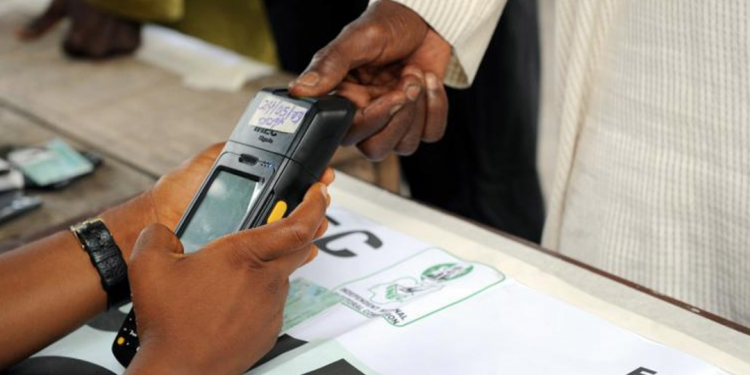DOUALA, Cameroon
Nigerians living abroad long for positive change in their country as it prepares to hold general elections later this month, although they remain pessimistic in their outlook.
In the run-up to the elections on Feb. 25, Anadolu met Nigerian nationals in Cameroon who expressed the need for change in their country.
Mboppi Market, Congo Market and the place known as “Ancien Troisieme” are the main commercial landmarks largely occupied by Nigerian nationals in Douala, Cameroon’s economic capital. Here, discussions are stormy among shopkeepers who hardly notice the presence of customers because they are too busy talking about the elections.
“We are concerned by what is happening in our country, even if we don’t have the opportunity to vote outside Nigeria. Some of us have already travelled to vote,” said Agu Ifedimma, the owner of a hardware store who left his country two years ago for business.
Cameroon, a Central African country, is home to about 4 million Nigerians and around 120,000 refugees from Nigeria. Women and girls make up 52% of the refugees and 55% are children, according to the United Nations High Commissioner for Refugees (UNHCR).
“The refugees in Cameroon are mainly located in the far north. They have fled terrorist violence by armed groups and insecurity,” the office told Anadolu.
Nigerians in the diaspora cannot vote in the general elections, including those in Cameroon.
“But many are traveling to Nigeria to participate in the vote. We continue to put pressure on parliament to approve diaspora votes,” said Afamefuma Alex Okorie, the president of a Nigerian community in Cameroon and a perfume shop owner.
How to vote is a concern for him as it is for many of his compatriots here.
“I don’t think Nigeria has the capacity to organize external elections. Those who are in the country already have difficulty accessing permanent voter cards and therefore voting. Several times I tried while I was still living in my country to get one, but it was never possible,” said Ifedimma.
The remoteness of the polling stations, the limited number of permanent voter cards, and insecurity prevent many people from voting, according to him.
“Nigerians want a better country, but many doubt that their votes will be counted. They fear manipulation of the results. If their votes are counted and they vote in large numbers as encouraged by politicians to go to the polls, it could force a change. But we have been disappointed in the past. We have voted for many parties that have disappointed us over time. We are now hoping for personalities that stand out,” he added.
Only faith in God
Ekene Mathew has been a trader of artificial hair for about 30 years in Cameroon. He left his country because of the insecurity situation, which has worsened over time.
“Things are becoming more expensive. Insecurity is worse than ever. Every day they kidnap people. Nigeria produces fuel, but when you go to the stations, you can’t get fuel or the cost is very high. It is very difficult to live there,” he said.
He hopes the elections “go well” and that there will be enough votes to make a change.
“I pray for it because our country has gone through many difficult times,” he said.
Like him, prayer is the bulwark of Nigerian nationals for “a better future.”
For Afamefuma, the upcoming elections feel special “because Nigeria has been going in a wrong way.”
“We want to believe that this time around, God will give us a leader that will lead our country with the fear of Him. All Nigerians are praying for change. God has blessed us with all endeavors, yet they are suffering because of mismanagement. Things are going the wrong way, down the drain. My prayers are for a positive change,” he said.
His compatriot Okechukwu Francis has been in Cameroon for a dozen years, trading biodegradable packaging. He also believes that “only people who have the fear of God” could bring about change in his country.
“I pray that God will change the hearts of our leaders so that people will be willing to practice the truth, for it is through the heart that human beings can understand the suffering of their fellow man and care for the welfare of others. Ghana is an example we should follow. The leaders there are truthful, and that is why democracy is properly implemented,” he told Anadolu.
Sick and tired
However, Francis does not believe that the current leaders would allow change, let alone the authorities, who he says are used to practicing injustice.
“I have no hope. It is impossible to change things in this country. I wonder where we are going to start,” he said.
Many portray a critical situation that portends a change in Nigeria is far away, even with a new leader and a new government.
People are “sick and tired of what is happening,” according to Ifedimma.
He is from the southeast of Nigeria, where he says life is more expensive than in the north, where two-term incumbent President Muhammadu Buhari is from.
“It is a big mess in this country actually. The price of fuel has gone up in my region, while in the north of the country, where Buhari comes from, it is cheaper. It’s disgusting, it’s quite disturbing,” he lamented.
Despite the critical context, these Nigerians told Anadolu that they hope to return to their country one day and live in better conditions.
“If there is a new government, it will have to move us forward and make us feel as comfortable as we are in other people’s countries. We should feel like Nigerians and not foreigners in our own country,” Mathew said.
Out of a population of more than 200 million, Nigeria’s Independent National Electoral Commission has registered more than 93 million voters, 176,846 polling units and 18 political parties.






